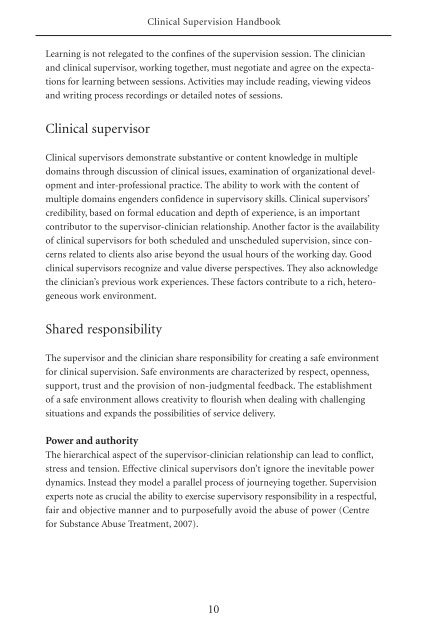Clinical Supervision Handbook - CAMH Knowledge Exchange ..
Create successful ePaper yourself
Turn your PDF publications into a flip-book with our unique Google optimized e-Paper software.
<strong>Clinical</strong> <strong>Supervision</strong> <strong>Handbook</strong><br />
Learning is not relegated to the confines of the supervision session. The clinician<br />
and clinical supervisor, working together, must negotiate and agree on the expectations<br />
for learning between sessions. Activities may include reading, viewing videos<br />
and writing process recordings or detailed notes of sessions.<br />
<strong>Clinical</strong> supervisor<br />
<strong>Clinical</strong> supervisors demonstrate substantive or content knowledge in multiple<br />
domains through discussion of clinical issues, examination of organizational development<br />
and inter-professional practice. The ability to work with the content of<br />
multiple domains engenders confidence in supervisory skills. <strong>Clinical</strong> supervisors’<br />
credibility, based on formal education and depth of experience, is an important<br />
contributor to the supervisor-clinician relationship. Another factor is the availability<br />
of clinical supervisors for both scheduled and unscheduled supervision, since concerns<br />
related to clients also arise beyond the usual hours of the working day. Good<br />
clinical supervisors recognize and value diverse perspectives. They also acknowledge<br />
the clinician’s previous work experiences. These factors contribute to a rich, heterogeneous<br />
work environment.<br />
Shared responsibility<br />
The supervisor and the clinician share responsibility for creating a safe environment<br />
for clinical supervision. Safe environments are characterized by respect, openness,<br />
support, trust and the provision of non-judgmental feedback. The establishment<br />
of a safe environment allows creativity to flourish when dealing with challenging<br />
situations and expands the possibilities of service delivery.<br />
Power and authority<br />
The hierarchical aspect of the supervisor-clinician relationship can lead to conflict,<br />
stress and tension. Effective clinical supervisors don’t ignore the inevitable power<br />
dynamics. Instead they model a parallel process of journeying together. <strong>Supervision</strong><br />
experts note as crucial the ability to exercise supervisory responsibility in a respectful,<br />
fair and objective manner and to purposefully avoid the abuse of power (Centre<br />
for Substance Abuse Treatment, 2007).<br />
10


